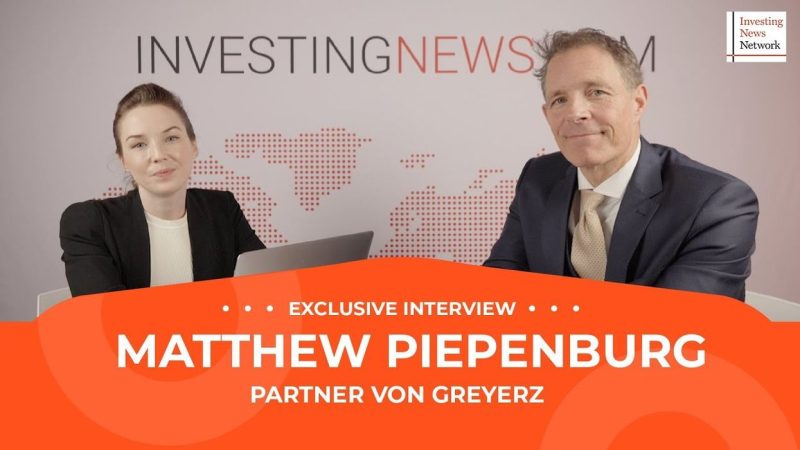February 7, 2024
Matthew Piepenburg: The Inflationary End Game – Gold’s Last Laugh
 Matthew Piepenburg: End Game is Inflationary, Gold Will Get the Last Laugh
Given the current global economic landscape, renowned financial analyst Matthew Piepenburg has made a thought-provoking argument that the end game is inflationary and that gold will emerge as the ultimate victor in this tumultuous economic battle. Drawing upon his extensive experience in the financial industry, Piepenburg presents a unique perspective on the future of the global economy and the role of gold in preserving wealth.
In a world where governments and central banks continue to print money at an unprecedented rate, the risk of inflation looms large. Piepenburg argues that the underlying factors driving this inflationary scenario are rooted in the growing levels of public and private debt, exacerbated by the unprecedented monetary policies enacted in response to the COVID-19 pandemic. These policies, such as quantitative easing and record-low interest rates, have created an artificial environment that is ripe for inflationary pressures to surge.
While many investors may turn to traditional assets, such as stocks and bonds, in times of inflation, Piepenburg asserts that gold will be the ultimate safe haven. He argues that gold has stood the test of time as a hedge against inflation, thanks to its intrinsic value and limited supply. Moreover, gold has historically outperformed other investments during periods of economic uncertainty and rising inflation, making it a valuable addition to any diversified portfolio.
Piepenburg further supports his thesis by pointing to the current macroeconomic trends that signal a potential inflationary storm on the horizon. Rising commodity prices, a weaker U.S. dollar, and increased fiscal spending are all key indicators of an impending inflationary cycle. Moreover, the unprecedented levels of government stimulus packages injected into the economy have the potential to unleash a wave of excess liquidity that can fuel inflation further.
In this environment of uncertainty and economic volatility, Piepenburg maintains that gold will not only retain its value but also appreciate significantly. As investors seek a reliable hedge against inflation, the limited supply and enduring allure of gold will drive its price higher. Moreover, the historical role of gold as a store of value and a hedge against currency devaluation solidifies the argument for its importance as an inflationary endgame asset.
While some may argue that cryptocurrencies like Bitcoin could potentially challenge gold's role as a safe haven asset, Piepenburg remains skeptical. He highlights the volatility and lack of intrinsic value inherent in cryptocurrencies, in contrast to gold's long-established position as a tangible store of value. Furthermore, the limited track record of cryptocurrencies during periods of economic uncertainty undermines their claim as a reliable alternative to gold.
In conclusion, Matthew Piepenburg's analysis of the current economic landscape highlights the significant risk of inflation and the pivotal role gold will play as the ultimate hedge. His well-reasoned argument draws upon historical evidence, macroeconomic trends, and the unique characteristics of gold to support his assertion that gold will emerge victorious in the end. As investors confront an uncertain future, Matthew Piepenburg's insights encourage them to consider the power of gold as a guardian of wealth in inflationary times.
Matthew Piepenburg: End Game is Inflationary, Gold Will Get the Last Laugh
Given the current global economic landscape, renowned financial analyst Matthew Piepenburg has made a thought-provoking argument that the end game is inflationary and that gold will emerge as the ultimate victor in this tumultuous economic battle. Drawing upon his extensive experience in the financial industry, Piepenburg presents a unique perspective on the future of the global economy and the role of gold in preserving wealth.
In a world where governments and central banks continue to print money at an unprecedented rate, the risk of inflation looms large. Piepenburg argues that the underlying factors driving this inflationary scenario are rooted in the growing levels of public and private debt, exacerbated by the unprecedented monetary policies enacted in response to the COVID-19 pandemic. These policies, such as quantitative easing and record-low interest rates, have created an artificial environment that is ripe for inflationary pressures to surge.
While many investors may turn to traditional assets, such as stocks and bonds, in times of inflation, Piepenburg asserts that gold will be the ultimate safe haven. He argues that gold has stood the test of time as a hedge against inflation, thanks to its intrinsic value and limited supply. Moreover, gold has historically outperformed other investments during periods of economic uncertainty and rising inflation, making it a valuable addition to any diversified portfolio.
Piepenburg further supports his thesis by pointing to the current macroeconomic trends that signal a potential inflationary storm on the horizon. Rising commodity prices, a weaker U.S. dollar, and increased fiscal spending are all key indicators of an impending inflationary cycle. Moreover, the unprecedented levels of government stimulus packages injected into the economy have the potential to unleash a wave of excess liquidity that can fuel inflation further.
In this environment of uncertainty and economic volatility, Piepenburg maintains that gold will not only retain its value but also appreciate significantly. As investors seek a reliable hedge against inflation, the limited supply and enduring allure of gold will drive its price higher. Moreover, the historical role of gold as a store of value and a hedge against currency devaluation solidifies the argument for its importance as an inflationary endgame asset.
While some may argue that cryptocurrencies like Bitcoin could potentially challenge gold's role as a safe haven asset, Piepenburg remains skeptical. He highlights the volatility and lack of intrinsic value inherent in cryptocurrencies, in contrast to gold's long-established position as a tangible store of value. Furthermore, the limited track record of cryptocurrencies during periods of economic uncertainty undermines their claim as a reliable alternative to gold.
In conclusion, Matthew Piepenburg's analysis of the current economic landscape highlights the significant risk of inflation and the pivotal role gold will play as the ultimate hedge. His well-reasoned argument draws upon historical evidence, macroeconomic trends, and the unique characteristics of gold to support his assertion that gold will emerge victorious in the end. As investors confront an uncertain future, Matthew Piepenburg's insights encourage them to consider the power of gold as a guardian of wealth in inflationary times.
If you would like to delve into the world of investment topics , go to our partner project Wall Street Wizardry


